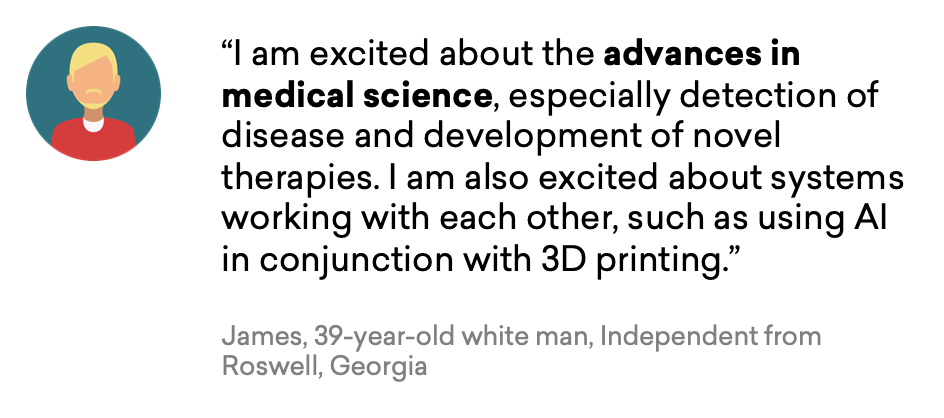Is this the most aligned we've seen Democrats and Republicans on any issue?
Summary: With support from the Omidyar Network, More in Common set out to study American attitudes toward Generative Artificial Intelligence (GenAI), a major technological development poised to profoundly impact our psychology, society, and politics. Our report, Between Hesitation and Hope, was released today. We find that GenAI represents a remarkable political opportunity for bipartisanship.
To our surprise, the results — based on a 2,771-person national survey, focus groups, and our 200+ person Americans in Conversation online panel — show that Democrats and Republicans share remarkably similar views on the role of government and big tech when it comes to GenAI.
The results reveal a window of opportunity in 2025 for the next administration and technology companies to exercise leadership on GenAI by changing the tone of the national conversation, restoring some of the trust lost in our major institutions, and demonstrating to an exhausted American public that we have the capacity to have hard conversations.
First, while AI technology brings risks, it also elicits genuine excitement from so many Americans. Political leadership often focuses on the negative — inflation and border dysfunction, for example — yet AI breakthroughs can inspire awe. Americans shared their optimism that AI can provide access to medical expertise in remote areas, offer greater productivity in the workplace, and even advance deep space exploration. In one focus group, a young female office worker exclaimed with laughter: “I'd love to have an AI assistant to be me. Are you kidding me? Please be me. And send all of my emails!”
Focusing on a technology brimming with opportunity allows leaders to depart from the cynicism that characterizes so much of our national conversation and direct our energies towards managing an invigorating new technology. This change in the tenor of our conversation could be most welcome by the Exhausted Majority and beyond.
Second, in our polarized society, Republicans and Democrats are astoundingly aligned in their attitudes towards Big Tech and government regulation of AI. Most (Democrats: 70%, Republicans: 72%) believe that “Big tech companies do not help the American public.” Members of the parties are just 6% apart (Democrats: 67%, Republicans: 73%) on the claim that “Generative AI government policies are not designed to help Americans.” To overcome this skepticism, town halls and participatory policymaking can help demonstrate leadership, give Americans a voice, and rebuild trust.
Third, Americans are open to persuasion on how to proceed. Americans are understandably reluctant at this early stage in GenAI’s development to declare a single verdict on the technology. We provided our survey respondents with nine AI cases that explored different AI roles, from personal assistants and doctors to judges and boyfriends. In 8 of 9 cases, there was no majority consensus on whether the technology would be more helpful or more harmful. Unlike so many ideologically and emotionally charged topics like immigration or abortion, the discussion of AI is less entrenched in identity and culture. Americans may prove more flexible and open to a constructive dialogue.
Finally, Americans recognize that GenAI risks inflaming our social ills; they will remember if our political and corporate leaders choose not to act. We discovered that many Americans fear that AI could exacerbate the challenges More in Common works to address—polarization, social cohesion, distrust—as it becomes increasingly integrated into everyday life. Four in five (83%) worry that AI will erode trust in news, and 65% fear it will further strain trust among people. One 55-year-old man from Bellevue, Washington shared a fear that GenAI “will be a stain on actual reality. We won't know what is real and what is artificial. It's already happening.” Americans worry especially about future generations becoming dependent on AI, never developing critical thinking skills, and falling further into social isolation.
The effort to restore a sense of connection and commonality in the United States requires that we notice — and seize — windows of opportunity when they appear. We should remember that the United States is the home of the leading GenAI companies, which brings both a point of pride and a duty of responsibility. Americans see both the technology’s promise and its potential peril. In a dispiriting moment, action on AI can remind us that we have the power to come together, listen to differing perspectives, and shape groundbreaking technologies in a way that gives Americans a sense of agency over their lives.
Full report
Our full report presents these key highlights in greater detail and offers more insights, a bespoke segmentation, and recommendations for stakeholders and policymakers. View it here.
We can’t do this without you!
Our mission is to understand the forces driving us apart, to find common ground and help to bring people together to tackle our shared challenges. Consider supporting our work by making a donation.




